The Role and the Character Liberation Front of the Slovenian Nation
Keywords:
Liberation Front of Slovenian Nation, Communist Party of Slovenia, revolution, resistance, national liberation struggleAbstract
The Liberation Front Slovenian Nation (LF) was founded on 26 April 1941 on the basis of the pre-war association of the Communists with the left-wing groups from the Liberal, Catholic and cultural circles. The LF embodied the Slovene spirit of resistance which found its extreme expression in an armed struggle against the occupier. This gave the LF a character of a military as well as a political movement. Its ideo-political programme was originally characterized by an equidistant opposition to any form of imperialism and by the waiting for an opportunity to carry out the revolution. After Germany attacked the Soviet Union, and after being instructed by the Comintern to do so, the LF engaged in the national liberation struggle against the occupiers, to which it attached the social dimension throughout. From the very beginning, the Communist Party of Slovenia not only played a decisive role in the LF but was also its organizational backbone. The LF, in turn, strengthened the Communist organization.
Downloads
Published
Issue
Section
License
Authors who publish with this journal agree to the following terms:
- Authors retain copyright and grant the journal right of first publication with the work simultaneously licensed under a Creative Commons Attribution License that allows others to share the work with an acknowledgement of the work's authorship and initial publication in this journal.
- Authors are able to enter into separate, additional contractual arrangements for the non-exclusive distribution of the journal's published version of the work (e.g., post it to an institutional repository or publish it in a book), with an acknowledgement of its initial publication in this journal.
- Authors are permitted and encouraged to post their work online (e.g., in institutional repositories or on their website) prior to and during the submission process, as it can lead to productive exchanges, as well as earlier and greater citation of published work (See The Effect of Open Access).


